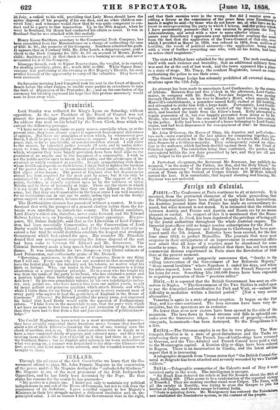Vronintifil.
Lord Stanley was reelected for King's Lynn on Saturday, without opposition. As the new President of the Board of Control was not present the proceedings attracted very little attention in the borough. An address was read on his behalf by the Town Clerk, from which we extract the following passages.
"I have never set much value on party names, especially when, as at the present time, they have almost ceased to represent fundamental ditlbrenees of opinion. But there arc principles of action which, by whomsoever pro- fessed, I shall be prepared on all occasions to support. I am for a policy of peace, and, so far as practicable, of non-intervention abroad. I will resist to the utmost, by impartial justice towards all sects and by undue defer- encee to none, the disorganizing influences of sectarian rivalry, influences which, whenever they have largely prevailed, have been fatal alike to the greatness of an empire and to the happiness of a community. I wish to see the public service open to talent in all ranks, and the advantages of in- struction as widely extended as possible. Deeply sympathizing with those whose livelihood depends on their labour, I think that to lighten the burdens of the poorer class, so far as is consistent with fiscal justice, should be the first object of our finance. The power of England over her dependencies abroad has been acquired for the most part by arms ; but it can only be maintained by a policy of moderation and equity. The support of such a policy, therefore, is equally enjoined upon us by the interests of Great Britain and by those of humanity at large. These are the views to which it is my desire to give effect. I hope that they are Liberal in the truest sense, but that they are Conservative in the truest sense I am well assured ; for no institutions can in our age be stable unless they rest on the freely- given support of a contented, because trusted, people."
The Hertfordshire election has passed off without a contest. It is un- aerstood that with the prospect of a general election before them the Li- berals were unwilling to disturb the county. The Liberal candidate, Lord Ebury's eldest son, therefore, never came forward, and Sir Edward Bulwer Lytton was, on Tuesday, returned without opposition. His pro- poser, Mr. Delano Radcliffe, said that as the Liberalism of Lord Palmer- ston had been essentially Conservative, so the Conservatism of Lord Derby would be essentially Liberal ; and if the latter noble lord only re- ceived a fair trial he would doubtless establish the longest and strongest Government which had existed for ages. His seconder Mr. Dimsdale denied that any arrangement respecting the future disposal of the seat had been come to between Sir Edward and Mr. Grosvenor. The Colonial Secretary made a long speech but chiefly interesting to his au- dience. It was remarkable for two things—a very liberal estimate of Lord Palmerston, and enthusiastic praise of Mr. Disraeli.
"Reverting, gentlemen, to the House of Commons, there is one thing that I will say. Every man who joins our standard in that assembly shall have the fairest play for his industry and his talents, no matter what his birth or fortune. Why, our leader in the House of Commons is a living illustration of a great popular principle. He is a man who has fought his way from the ranks of the party to its head, who has obtained a power and a position higher than birthright and property give to the son of Dukes. And how ? By his own remarkable talents, by his own indefatigable indus- try, and, permit me, who have known him from our earlier youth, to add by many gallant and generous qualities which attach friends, and which while I claim them for my friend, I readily grant to every eminent man of every party who aspires to lead the gentlemen of England in the House of Commons.' (Cheers.) Sir Edward glorified the penny press, and expressed his belief that Lord Derby would settle the question of Parliamentary reform. "I take leave in the meanwhile to say, that the party with which I act have no more to fear from a fair and just extension of the franchise than they have had to fear from a fair and just circulation of political know- ledge."
The Cardiff Magistrates have acted in a most unwarrantable manner— they have actually committed three American mates because they knocked about a lot of black fellows !—breaking the arm of one, tearing open the cheek of another, and so on. These American officers were so happy as to have a crew composed chiefly of negroes and coloured men ; and they were treating them outside the port of Cardiff as if they had them in a port of the Southern States ; but an English pilot informed the town authorities of what was going on. a steamer was despatched to the ship—the Gleaner—the first, second, and third mates were arrested, and the wounded seamen were brought on shore.


























 Previous page
Previous page